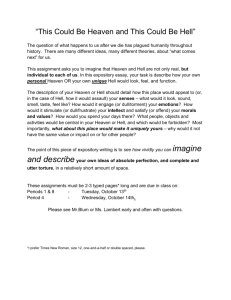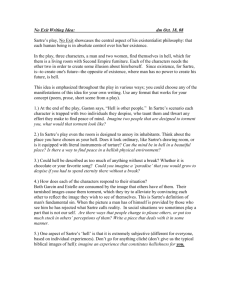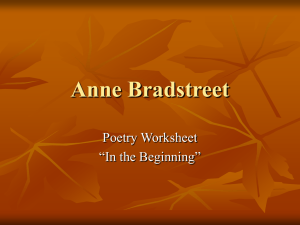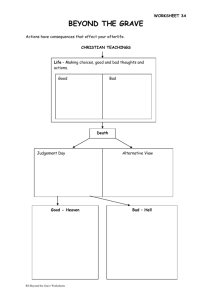The Great Divorce Preface through 6
advertisement
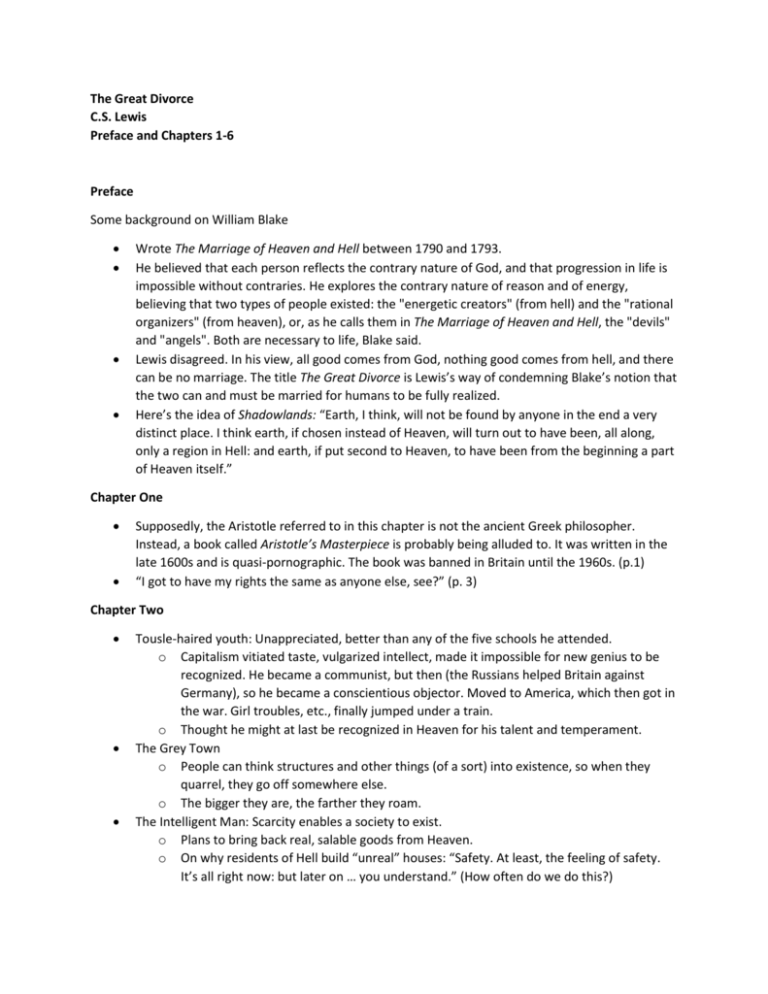
The Great Divorce C.S. Lewis Preface and Chapters 1-6 Preface Some background on William Blake Wrote The Marriage of Heaven and Hell between 1790 and 1793. He believed that each person reflects the contrary nature of God, and that progression in life is impossible without contraries. He explores the contrary nature of reason and of energy, believing that two types of people existed: the "energetic creators" (from hell) and the "rational organizers" (from heaven), or, as he calls them in The Marriage of Heaven and Hell, the "devils" and "angels". Both are necessary to life, Blake said. Lewis disagreed. In his view, all good comes from God, nothing good comes from hell, and there can be no marriage. The title The Great Divorce is Lewis’s way of condemning Blake’s notion that the two can and must be married for humans to be fully realized. Here’s the idea of Shadowlands: “Earth, I think, will not be found by anyone in the end a very distinct place. I think earth, if chosen instead of Heaven, will turn out to have been, all along, only a region in Hell: and earth, if put second to Heaven, to have been from the beginning a part of Heaven itself.” Chapter One Supposedly, the Aristotle referred to in this chapter is not the ancient Greek philosopher. Instead, a book called Aristotle’s Masterpiece is probably being alluded to. It was written in the late 1600s and is quasi-pornographic. The book was banned in Britain until the 1960s. (p.1) “I got to have my rights the same as anyone else, see?” (p. 3) Chapter Two Tousle-haired youth: Unappreciated, better than any of the five schools he attended. o Capitalism vitiated taste, vulgarized intellect, made it impossible for new genius to be recognized. He became a communist, but then (the Russians helped Britain against Germany), so he became a conscientious objector. Moved to America, which then got in the war. Girl troubles, etc., finally jumped under a train. o Thought he might at last be recognized in Heaven for his talent and temperament. The Grey Town o People can think structures and other things (of a sort) into existence, so when they quarrel, they go off somewhere else. o The bigger they are, the farther they roam. The Intelligent Man: Scarcity enables a society to exist. o Plans to bring back real, salable goods from Heaven. o On why residents of Hell build “unreal” houses: “Safety. At least, the feeling of safety. It’s all right now: but later on … you understand.” (How often do we do this?) The light of Heaven reveals hideousness of all the passengers. Chapter Three His fellow travelers are transparent. “One could attend to them or ignore them at will as you do with the dirt on a window pane.” Everything more real is harder, denser. (Again, we live in the Shadowland of earth when compared with heaven.) The people of heaven. Some were naked, some robed. “But the naked ones did not seem less adorned, and the robes did not disguise in those who wore them the massive grandeur of muscle and the radiant smoothness of flesh. “I did not entirely like it.” Chapter Four The Big Man is angry that a murderer was in Heaven while he was in Hell. The murderer’s response when asked if he’s ashamed: “I do not look at myself. I have given up myself. I had to, you know, after the murder.” Big Man: “I done my best all my life, see? … I’m asking for nothing but my rights. Murderer’s response: You will not get your rights. You’ll get something far better. Big Man: I’m not asking for anybody’s bleeding charity. Murderer: Ask for the Bleeding Charity. Big Man: I’m a decent man. Murderer: You weren’t, and you didn’t do your best. Murderer: Murdering Old Jack wasn’t the worst thing I did … I murdered you in my heart … Big Man: “I’d rather be damned than to go along with you.” He feels triumph in his refusal. Chapter Five The cultured man criticizing Dick for believing in a literal Heaven and Hell. “You have been in Hell, though if you don’t go back you may call in Purgatory.” (Shadowlands idea.) … You went there because you were an apostate.” There are sins of intellect, such as denying the Resurrection. Why did they commit this sin? “We were afraid of crude Salvationism, afraid of a breach with the spirit of the age, afraid of ridicule, afraid (above all) of real spiritual fears and hopes.” “I have been talking of the past in order that you may turn from it forever … I am telling you to repent and believe.” The cultured man: “For me there is no such thing as a final answer … to travel hopefully is better than to arrive.” (Conservatives hate questions, liberals hate answers.) We have a little Theological Society down there. (Jesus would have outgrown some of his earlier views if he had lived. Chapter Six Ghost trying to take apple back with him to Hell. Waterfall tells him: There is not room for it in Hell. Stay here and learn to eat such apples. Why is there no room? Heaven can tolerate nothing evil, Hell can tolerate nothing good. The divorce is complete and final.


